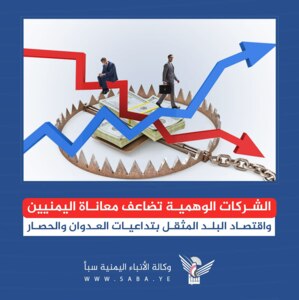
SANA'A June 10. 2023 (Saba) - Eight years of aggression and siege on Yemen resulted in catastrophic repercussions on economic activity in the country, the interruption of salaries and the dwindling of job opportunities, which prompted many citizens to sacrifice their remaining savings or real estate assets in order to obtain a source of income to meet the burdens of life, what made them victims of phantom stock companies.
The past eight years of aggression witnessed the emergence of many of these fictitious entities, which took advantage of the country's difficult and exceptional situation to collect large sums of money from thousands of citizens who were trapped in many ways and means after presenting them with imaginary offers, instilling illusion in them, and pushing tens of thousands of women to sell what they wanted. They have jewelry and ornaments to buy their shares.
While many risked their real estate and non-real estate assets, without even obtaining bank accounts to keep their money, nor bonds, guarantees, or official offices to turn to if necessary, so that the majority of them ended up in poverty and misery, after they lost everything they owned.
These companies present themselves as joint stock companies, but the mechanisms and methods of their work remain vague and unclear while their profits are illogical, contrary to the nature of the work of real joint stock companies governed by licenses, procedures and official transactions.
The fictitious companies depend on what they call representatives who are active on social media and work on marketing according to a hierarchy, without there being any addresses or headquarters for these fictitious entities or contracts, licenses and commercial records from the Ministry of Industry and Trade.
These entities initially pay fictitious profits to their first shareholders and make attractive offers, and use a large network of male and female delegates to lure as many new victims as possible, especially from families and groups with less education.
The hierarchical marketing followed by these companies means paying profits to the old shareholders from the funds of the new shareholders, so that the business will continue to exist in the presence of new customers, and while convincing the existing customers to continue their investment.
The shareholders of these deceptive companies realize too late the fact that their money was lost and that they fell into the trap of fraud, after many of them contributed to the infliction of more victims, in order to obtain the so-called commissions that are calculated as a metaphor for everyone who brings more shareholders, as the organizers claim It is these companies that those commissions are added to the balances of the delegates.
It is also clear to the victims later that these companies do not engage in any real economic activities and do not have fixed addresses. Rather, they exploit citizens and their needs in light of the cessation of many economic activities and the exacerbation of the burdens of life as a result of the aggression and blockade.
Despite the repeated warnings launched by the Central Bank of Yemen in Sana’a to all citizens against dealing with any companies or entities claiming to conduct business and invest money without obtaining the necessary licenses from the official authorities, the methods and tricks adopted by these fictitious entities enabled them to collect huge funds from Citizens exploiting their need and suffering.
The Central Bank affirms that those companies and entities that claim to employ shareholders’ money in financial, real estate, or commercial activities based on fraud, they are disbursing temporary profits to lure the largest possible number of victims.
The bank had directed the exchange companies to apply the necessary procedures to identify the customer and the real beneficiary in accordance with the instructions in force, and to ensure that the companies obtain legal licenses from the Ministry of Industry and its offices in the governorates.
While the bank's information collection unit instructed exchange companies to seize the accounts and funds of many people and phantom stock companies, which do not have licenses to practice this activity.
According to the communiqué issued by the Central Bank at the end of Dhul-Hijjah 1443 AH, dealing with these fictitious companies and entities exposes any person to legal accountability.
The activity of these companies outside the official and legal frameworks causes great harm to the citizens who contribute to them because of the suffering, heartbreak and remorse that results from the loss of their money, while the greatest damage is caused to the Yemeni economy as a result of these fake companies transferring the huge funds they have collected into hard currency and smuggling them out of the country.
In addition, the suspicious financial activities of these companies fall within the framework of money laundering operations that have dire consequences that greatly harm the country's currency and economy.
Official sources in Sana'a confirm that the number of victims who are shareholders in these companies exceeded 300,000 subscribers, the majority of whom are women, while the lost amounts are estimated at tens of billions, which are large numbers.
After the truth of many of that imaginary entity and its despicable goals was revealed, many observers did not rule out that it came as an extension of the aggression and siege and within the framework of the economic war waged by the coalition of aggression against the Yemenis.
Observers saw that these mysterious entities came to rob the Yemenis of their remaining savings and property after the aggression robbed them of their salaries, jobs and all their rights.
It is noteworthy that Yemeni law prohibits exchange companies and facilities or any other unofficial entity from keeping citizens' money or even opening accounts for them.
The law also considers the establishment of any company, commercial or investment entity without obtaining prior official licenses, an explicit violation that exposes those in charge of it to accountability.
M.M